- Home
- Marilynne Robinson
Mother Country: Britain, the Welfare State, and Nuclear Pollution Page 4
Mother Country: Britain, the Welfare State, and Nuclear Pollution Read online
Page 4
The mandate of Poor Law charity was only to provide subsistence, because if the recipient of charity were to do as well as the independent worker, the worker, too, would become demoralized and slide into pauperism. At the same time, a very important article of economic faith was that the wages of workers could not exceed subsistence—if they did, the depletion of capital would cause a decline in investment and employment that would return the worker unceremoniously to something less than the level of subsistence. So it was difficult to make the situation of paupers less desirable than the situation of the employed, especially considering the horrendous conditions under which most work was done. Paupers were subjected to the miseries of the separation of their families, and they were auctioned off or forced into emigration, depending on the improvisations of local authorities determined to keep relief recipients to an absolute minimum. To assure that parish assistance would be limited to those who were qualified by birth or legal settlement to receive it, the movement of workers was narrowly restricted.
The abusive treatment of paupers was justified on the grounds that it discouraged the class above them, the employed, from sinking into Poor Law dependency, and it was justified by the suspicion that the class below them, the poor unworthy of assistance, were to be found among them despite all precautions, and it was justified on the grounds that dependency easily became habit, that charity demoralized its recipients. Every worker was a potential pauper, and every pauper was a burden, presumptively demoralized, and an agent of demoralization of others. These assumptions created and sustained the legal situation of the great majority of British people.
Even now British subjects have no rights established in law. Supposedly they enjoy customary rights, but where in their harrowing history any custom friendly to their interests could have been established I am at a loss to know. Until the 1980s people were imprisoned without trial on the word of the arresting officer for appearing to intend a crime, under the Vagrancy Act of 1824. Such arrests have supposedly ended, but in Britain few things ever really end. Clearly, those against whom such laws are carried out have none of the protections we imagine to be “Western.” The laws are highly consistent, however, with the conditions of the Poor Law, which voided every notion of individual rights—except, of course, the slippery right to subsist, always boasted of and worried about despite high rates of death among paupers, and at best enjoyed only by those the parish could or would relieve.
Parliament, which would be the political expression of fundamental rights in the British population if it were a straightforward representative institution, is characterized by an extraordinary mix of prerogatives and disabilities, which combine to weaken all other institutions without creating real power in the Parliament itself. No British court can override the laws it passes. Recently it abolished seven major elected city governments, including the Greater London Council, an action of special significance because these were major power bases for the Labour Party. To this day Parliament can expunge an official crime by legalizing an action of government retroactively. It has almost perfect legislative freedom, in theory, but in fact it has no right to any information the Prime Minister does not give it. A bill, while it is in preparation, is an Official Secret, forbidden to Members of Parliament as to anyone else. Experts on modern Britain describe the system as an elective dictatorship, but I have my doubts about that formula. Whitehall, the bureaucracy that is actually charged with developing legislation, collecting information, and implementing policy, is not elected, and does not change with parties or ministries. Question time, when the Prime Minister replies to questions from Members of Parliament, can deal only with specified subjects. It is forbidden, for example, to inquire into purchases made by the National Health Service. As Ralf Dahrendorf, head of the London School of Economics, says in his book On Britain, “What happens is not decided in Westminster [that is, in Parliament]. It is not even discussed at Westminster in any detail. As a result, the visible political game becomes strangely superficial.” Mr. Dahrendorf admires the system, on balance. However, that the “deceptively lively adversary surface”6 of parliamentary activity is a surface, rather than an authentic and consequential process of deliberation, means that even the right to vote is a very small concession of power on the part of those who do decide “what happens.” In other words, there is a pervasive absence of positive, substantive personal and political rights in Britain.
The structures of institutions express conceptions of society. Sellafield amounts, in its dinosaur futurism, to a brutal laying of hands on the lives of people: a blunt, unreflecting assertion of power. It is the same unchallenged assertion of economic prerogative that legally immobilized the majority of the British population for five hundred years, so that the cost of relieving their wretchedness, when wretchedness became extreme, could be contained.
The movement of workers from the country to the cities and from the North to London demonstrates that these laws, which mandated the forced return of strayed workers to the place of their legal settlement, were not consistently enforced, though in the beginning of this century Beatrice Webb, guiding spirit of Fabian socialism, may be heard grumbling about the numbers who were returned and the costs entailed. If cities represented opportunity, relatively speaking, migrants had the impetus of destitution and humiliation at their backs, to enhance the pull of urban life. Everywhere, whatever they did, workers were seen as burdens, actual or potential, and this perception governed every aspect of their existence.
America had its paupers and poorhouses, through the nineteenth century at least, though these institutions seem never to have seized on the national imagination, or to have remained in the popular memory. Hawthorne’s failed utopia, Blithedale, becomes a poor farm. Thoreau is visited at Walden by paupers, including one who declares himself “deficient in intellect.” In the early twentieth century, Booker T. Washington notes that blacks are almost never paupers, by which he means that they are provident and self-sufficient people. Given our profound cultural debt to Great Britain, it is no wonder if our policies with regard to the poor are sometimes crude and high-handed. But imagine what it would be like if we had truly replicated British social organization, if every American who lived by a wage had been immobilized to simplify the administration of welfare in the event he should need it, and if this arrangement had been persisted in for hundreds of years. This would surely trench very far on the dignity and liberty of citizens, and their pursuit of happiness.
Margaret Thatcher is easing the burdens of Britain by cutting back on education, health care, and other threadbare amenities, pinching one of the poorest populations in Europe, supposedly to punish and cure their poverty. This is a typically visceral reaction against the supposed cost to the state of allowing meager comfort to people perceived as demoralized and reduced to dependency by intemperate generosity.
Such patterns of reaction are as old as Poor Law itself. William Beveridge, who wrote the celebrated Plan for the Welfare State in 1943, promised “subsistence” to employed people in conditions of high national employment. This is the great socialist dream against which the present government recoils. Americans, perhaps because they romanticize their origins, never think of the lives of British people as circumscribed and poor, historically or at present, though many of them are descended from the outcasts and refugees of this same penurious system. That any society could promise so little, and then renege, seems preposterous, except against the background of British social history.
How does one back away from a promise of subsistence? As an economist, Beveridge knew that the historical meaning of the word has only been that one should not die of starvation in its starkest form. Disease, poisoning, exposure, malnutrition, and exhaustion have never been treated as incompatible with subsistence, though they have slain multitudes. In other words, though in Britain historically it has been used to establish the wage of a worker, in theory and in practice, and as the measure of mercy to the afflicted, and as the animating vision o
f the armies of reformers, subsistence has always been, conceptually speaking, a rotten nut. Beveridge’s promising it under certain—historically atypical—conditions implies that, under other conditions, people must expect less. If subsistence seemed to the British public of the late forties a bright prospect, less-than-subsistence must have seemed to them to describe their situation before the war. (During World War II, food rationing improved the British diet and health. Since Beveridge presided over the distribution of food, perhaps a definition of subsistence was inferred from his successes in relieving poor nutrition. However, postwar austerities returned nutrition to prewar standards.)
It should shock us that the virtual constitution of a modern state could imply that the subsistence of its people was not to be assumed in the event of unfavorable, and highly typical, economic conditions. William Beveridge wrote an escape clause into his Plan for the Welfare State, and Margaret Thatcher has availed herself of it. Beveridge, claiming the influence of Maynard Keynes, opined that government could stimulate employment so as to maintain it at the level necessary to make his plan viable. In other words, in the absence of ongoing government action, the plan would collapse. For years the British government has systematically created unemployment, so the plan, whatever it amounted to, has lost its economic rationale. It was designed to be possible only if it was not especially necessary.
The ancient pattern of dubious charity provoking horrified reaction against the object of charity is being repeated now in the radical attack on the meager fabric of public amenity—they are selling the Thames—and, in general, on the standard of living of the poor, whose consumption of medical care has been curtailed by the collapse of the National Health Service, and whose real income has been reduced by the curtailment of every kind of provision the state so gallantly undertook in 1948, appropriating to itself thereby, as William Beveridge knew and said, the socialization—the control, that is—of demand.
The mechanism built into the British Welfare State which allows demand to be depressed was perfected in the Poor Law system. It is the combination of poverty-level wages, heavily taxed for good measure, with a system of national decency and, shall I say, comity which brings real income back up to the level considered economically convenient by the government of the day. Britain has never had a minimum wage. Wages have always been notional. Against the large reductions of public provision now being made, a few percentage points of increase in wages claimed by the present government mean absolutely nothing.
What is happening now is a counterattack against the demons which the British ruling class and middle class have always felt to be released by charity, whether public, private, secular, or religious, and also by prosperity among those classes of people for whom prosperity is not customary. To these supposed erosions of order and value, and infringements on the wealth of the well-to-do, the characteristic response is a swingeing punishment.
Poor Law and the society it generated amount to a prehistory of America, not only because its mechanisms of expulsion peopled these shores, but also because it created the legal context which made life, liberty, and happiness revolutionary aspirations. The early history of Poor Law is barbarous, and its violence will seem specific to an early period. But the occasion for this book is the knowing and calculated contamination, by the British government for profit, of a populous landscape, with the most toxic substance known to exist on earth. And it is my impression that leukemia, like older misfortunes, alters one’s appearance for the worse. If anyone wishes to object that my comparison is unfair or sensational, I reply that the motive behind all these martyrdoms is profit, and, more precisely, the threat and terror of redundancy, of lives existing in excess of economic demand. Without Sellafield there would be even more unemployment. Barbarous exactions are still being made on economic pretexts.
Poor Law appeared first in the form of the Ordinance of Labourers promulgated in 1349 under Edward III, which required work at legally limited wages of all able-bodied workmen and workwomen “free or servile,” anyone who refused being jailed “until he find security to serve in the form aforesaid.” The occasion for this ordinance was the Black Death, which had depleted the population so severely that workers were in great demand, and accordingly able to ask for higher wages than they had previously received. There was at the same time an inflation in prices which must have made higher wages necessary, because working people chose to be idle rather than to accept the pay they were offered, even though they were, as described in this same law, people with no resource but the sale of their labor. Clearly the interest of the state, and its authority, merge with those who employ. The principle established in 1349, and not departed from even now, when unemployment is created as a policy of government, is that “the commonwealth,” the employing minority, has a presumptive right to the labor of working people, with no obligation to acknowledge its value, whether as established by demand or as giving consideration to the share of labor in the creation of wealth.
In the theory of political economy, workers compete to sell their labor in a free market. In theory, which bears a most complex relation to practice, their labor creates all value. The Ordinance of Labourers is directed against the development of a labor market in conditions which would make demand favorable to the workers’ interests. The more typical condition of “redundancy,” of glut in the labor market, would be allowed to cheapen labor, however, though low wages, by driving women and children into employment, contributed greatly to the excess. Read aright, Poor Law is a system which severs work from any notion of its objective worth by criminalizing idleness. This unconditional claim made in the Ordinance of Labourers on free and servile alike—on those who had managed to wrest themselves from serfdom and those who had not—raises questions about the distinctions between free and enslaved workers which remain lively into the twentieth century.
The Ordinance of Labourers contains another feature characteristic of later Poor Laws. It forbids charity to “sturdy beggars” on the grounds that such people are guilty of withholding their labor. The adjective “sturdy” implies that the old or infirm may be relieved, enforcing the distinction on the charitable thus:
And because many sturdy beggars, so long as they can live by begging for alms, refuse to labour, living in idleness and sin and sometimes by thefts and other crimes, no man, under the aforesaid penalty of imprisonment, shall presume under colour of pity or alms to give anything to such as shall be able profitably to labour, or to cherish them in their sloth, that so they may be compelled to labour for the necessaries of life.
Idleness in the able-bodied is wicked and leads to wickedness, and therefore to extend charity to the undeserving is itself an act worthy of punishment. Anyone confronted by a beggar who might be called able-bodied would exercise caution. Thus, at the small cost of denying alms to some who deserved them, the great public benefit would be gained of extracting labor from those fit to work. Sound morals and sound economics at a single stroke.
It is characteristic of Poor Law as a phenomenon to attempt to suppress the charitable impulse and, where benefit is transferred, to maximize its effectiveness as social coercion. The conditions imposed on the giving of charity make it no charity at all. That for which it is exchanged—submission, in a word—makes it instead an unusually good bargain, especially since more niggardly assistance is more effectively controlling. This fortunate conjunction of advantages will be sought with increasing rigor and system, but by the same methods, over centuries. Beatrice Webb herself will brood over the well-being of the working poor with a sublime concern that they should not be corrupted by any largesse, public or private, that succors them when their need is not exquisite. In fact, a most rigorous discrimination between worthy and unworthy poor, morally earnest in the extreme but sadly inclined to pinch and humiliate the worthy in order that no reprobate should escape unpinched and unhumiliated, will become the primary care of British philanthropy, enlisting the efforts of the finest spirits and the loftiest minds.
>
Certain features of this fourteenth-century ordinance should be noted. It deals with working people exclusively, depresses their wages and exacts their labor, and worries over their tendency to be taken for or treated as needy people, unable to work, whose right to charity is implicitly conceded. For a long time, well into the twentieth century, the words “poor” and “labourers” and “workers” will be used interchangeably. Like the Ordinance of Labourers, the Poor Laws will be directed at working people, whose normal condition is assumed to be poverty. Paupers, the destitute, those who fall short of subsistence, are simply workers in sickness or old age or widowhood or madness or despair, or whose trade has become obsolete or whose industry has gone into crisis, or whose wages have fallen so low that they work and are still indigent and dependent. “Pauper” is simply Latin for “poor,” logically enough. The word implies a distinction whose reality is doubtful at best, since the whole class of workers or poor were governed by laws supposedly designed to relieve and discourage pauperism.
The distinction between workers and the poor is not made, because workers are poor, and, as a class, are vulnerable to utter destitution. This fundamental relationship of labor to the purchasers of labor will attract rationalizations the way a magnet does pins. Frequently these rationalizations are at odds with one another, but this does not matter, because as justifications of an existing order, their very variety indicates profound consensus.
The Ordinance of Labourers, with its refusal to distinguish between free and servile, was clearly designed to shore up erosions in the feudal system. An act of the twelfth year of Richard II, in 1388, reinforced this effect. This law anticipated the later Acts of Settlement, which would continue in effect in association with the Poor Laws down to 1948. It forbade any laborer to leave the town or borough where he lived without a “letter patent containing the cause of his going and the time of his return.” Towns were to maintain stocks where any laborer traveling without a letter could be kept “until he have found surety to return to his service or to serve or labour in the town from which he comes.” Those who cannot work, “beggars unable to serve,” are immobilized in the same way and by the same means. Thirty years after the plague, labor was still scarce, still exacted: “As well artificers and craftsmen as servants and apprentices” are “to be forced to serve in harvest at cutting, gathering, and bringing in the corn.” The law specifically limits the wages of categories of workers, “because servants and labourers will not and for [a] long time have not been willing to serve and labour without outrageous and excessive hire and much greater than has been given to such servants and labourers in any time past.”

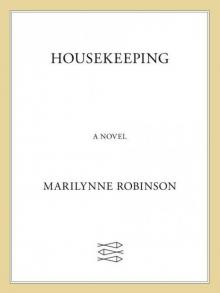 Housekeeping: A Novel
Housekeeping: A Novel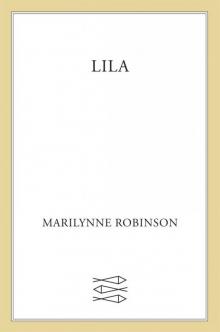 Lila
Lila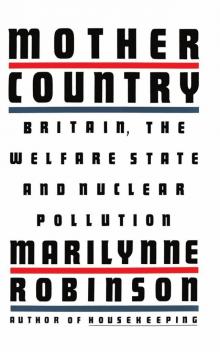 Mother Country: Britain, the Welfare State, and Nuclear Pollution
Mother Country: Britain, the Welfare State, and Nuclear Pollution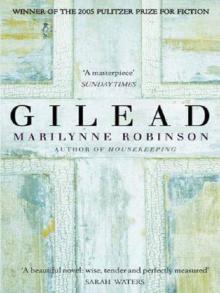 Gilead
Gilead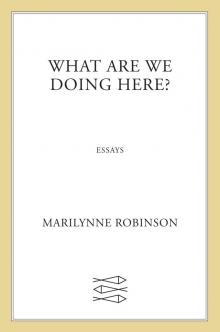 What Are We Doing Here?
What Are We Doing Here? Home
Home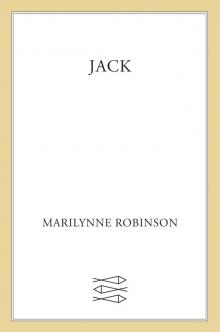 Jack
Jack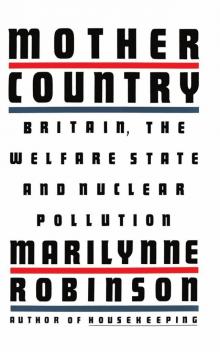 Mother Country
Mother Country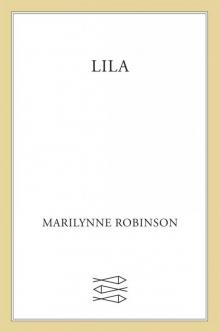 Lila: A Novel
Lila: A Novel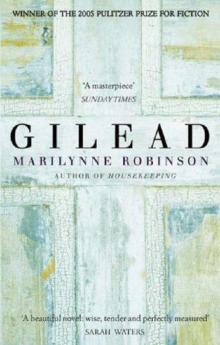 Gilead (2005 Pulitzer Prize)
Gilead (2005 Pulitzer Prize)